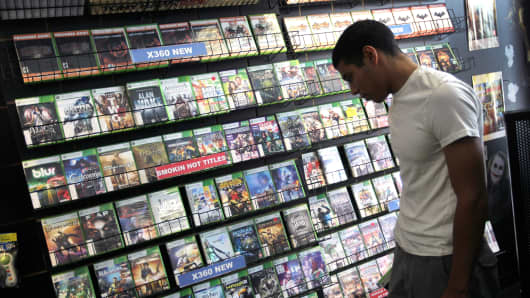Videogame makers have had a tough time lately. But when new consoles are finally released, will the stocks be able to level up?
Electronic Arts had a huge day Wednesday, rising 17 percent. This after the videogame company provided guidance on Tuesday evening that was well above estimates. EA estimated that it would earn $1.20 a share in fiscal 2014, versus an average estimate of $1.10.
Fellow gamemakers Take-Two and Activision Blizzard enjoyed gains on Wednesday's session.
(Read More: EA Revenue, Outlook Top Forecasts; Shares Jump)
The key to EA's future is simple: next-generation consoles. Sony is preparing to release its next PlayStation, and Microsoft is expected to announce the release of the next Xbox shortly.
In a Wednesday note, Wedbush Michael Pachter reaffirmed his outperform rating on EA and boosted his price target by a dollar, to $26. One of the reasons he is excited about the company is that "we expect that the next-generation consoles will be sufficiently different from current generation consoles to drive sales higher," he said.
On EA's earnings conference call, Executive Chairman Larry Probst (who took on chief executive duties when former CEO John Riccitiello stepped down in March) said EA's "most important" priority is to ensure that it is "well-positioned to deliver the best games and services on the next-generation consoles."
This next generation has been gestating a long time.
"The last generation of consoles was a very long, attenuated console cycle," said Billy Pidgeon, an analyst who covers game companies for M2 Research. "Usually generations are closer together."
That could be one culprit behind in the dreadful game sales numbers that investors have become used to. According to the latest data from the widely followed NPD Group, domestic retail sales of videogame hardware, software and accessories were down 10 percent in March year-over-year. Sales of the outdated hardware dropped a stunning 32 percent.
Will the new console cycle turn that around? Not necessarily, according to Pidgeon.
"There are consumption changes that are going on," he said. "According to the NPD numbers, it would appear that people are playing and buying fewer games," he said. "What's missing is the greater effect of where you buy 'Call of Duty,' say, and then you download additional add-ons."
But some point to broader and more troubling changes.
In a note released after EA's earnings, Colin Sebastian, who covers the name for Baird, said, "Emerging game platforms may undermine the legacy console business. The advent of new smartphone and tablet platforms … is transforming the market and limiting growth opportunities for console games."
For Sebastian, it's just a matter of time—the gamer's time. "Online game platforms are competing for a share of the entertainment budget and time playing videogames," he wrote. And similarly, "the advent of social networking and social network gaming … may over time reduce the time available for console gaming." He rates EA neutral with a $19 price target.
But Pachter said the impact of tablets and other new experiences on traditional videogames has been vastly overstated.
"If you have 60 hours of leisure time, and now you spend three hours of it playing games on a tablet, your leisure time just dropped five percent," the analyst told CNBC.com. "So that means something else is going to drop five percent. It's a question of—is your gameplay going to suffer, or will it be your sleep, or will it be going outside and getting exercise? Probably all of them, a little bit," he said. But "nobody's going to stop playing 'Call of Duty' to play 'Angry Birds.' "
Pidgeon is of the same mind. "The audience for tablet games and mobile games is not the same audience as for console or high-end PC games," Pidgeon said. "Tablets and mobile might encroach a bit, but it's a more casual sort of experience."
The one risk for EA could be the quality of the games themselves. The company announced that it plans to release only 11 games in fiscal 2014, compared with the 13 released in fiscal 2013. But that " 'Fewer, Bigger, Better' strategy … will not work if the games are, in fact, not 'Better,' " Pachter wrote in his note.
So, will the new games actually be good?
"Let's hope," Pachter said. "I don't know, I think they might be." After all, he added, "they've screwed up enough already."










